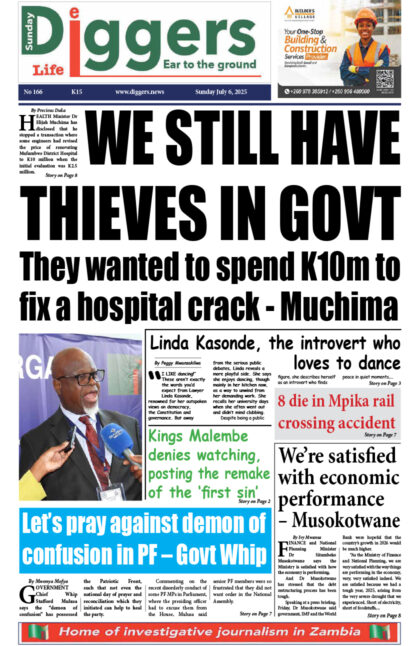German Ambassador to Zambia, His Excellency Mr Achim Burkart, has expressed concern that the prevailing operating environment for journalists will only get worse as the country approaches the 2021 general elections. He adds that journalists must be allowed to regulate themselves instead of the government taking a centre stage to push the agenda for statutory regulation.
“I came just shortly before the 2016 elections and I witnessed how the pressure on the press stepped up in front of the elections. So my educated guess is that it will happen again. I am not very optimistic about protection of the press as the country heads towards the elections in 2021 because I saw how it went before the last elections, and having been part of the observer mission, all the recommendations we made are still there,” said Burkart.
“…My personal view and also the view of my government is that the press should self-regulate and not be regulated by the government. So this self-regulation, I think it’s important because then you have the process in your hands as journalists and media houses and you don’t have anybody else to talk and regulate you. I know Mr [Chanda] Kasolo has a totally different view about this and I don’t agree with what he says.”
Indeed, we also don’t agree with Mr Kasolo and his minister Dora Siliya on this statutory media regulation framework because it has been deliberately crafted to muzzle the press. So we are happy to hear our shared view being expressed by the German Ambassador. We could not have said it any better. His concerns are very genuine and if we had a listening government in place, they would pick a word or two from the candid free advice offered above.
But because people in this leadership don’t listen, they will pay no attention to this, but rather push for laws that benefit them rather than the people. What has shocked us about this desperation from government to regulate journalists in Zambia is that they don’t seem to understand that the Access to Information Bill is more important than legislating laws that will further infringe on the already suppressed liberties of newsgathering in the country.
We do not even understand how this priority for legislating statutory media regulation has surpassed or overtaken the Access to Information Bill with such terrific speed. This raises some questions. What is government’s interest in this agenda?
In November 2018, we were compelled to write an editorial opinion, congratulating the Chief Government Spokesperson and Minister of Information, Dora Siliya, after she pledged that before the end of 2019, the long forgotten Access to information Bill would be enacted into law.
Her reasoning was that if government planned to defuse fake news, it first needed to quickly pass the Access to Information Bill that would allow citizens to legally access factual data from State institutions.
“As government, I know that the elephant in the room is always the regulatory framework and the Access to Information Bill which I have committed [to] since I became minister about 10 months ago for this ministry, that in the next sitting coming next year, we should be able to pass it through Parliament. The Access to Information Bill has been sitting for I think over seven years going back and forth in terms of discussions between the journalists and government,” said Siliya last year.
“I can definitely assure you that the Access to Information Bill will come because it is government that is tired of fake news. We want citizens to be able to walk into our offices so that we can explain to them that ‘this is how things are done’.”
We are puzzled to see how the minister doesn’t like this topic anymore. Where has that zeal to enact the Access to Information Bill gone? How has it become irrelevant now? The year is coming to an end so which 2019 was the minister talking about when she promised to take the bill to Parliament? It is a shame to see a minister who promised access to information rushing to first enact a law that regulates the media.
We must emphasise that what the Ministry of Information and its attack dog, the Independent Broadcasting Authority, are doing to the media in Zambia is horribly wrong. It is wrong not because News Diggers! says so or the German Ambassador thinks so, but because the Patriotic Front itself says so.
What Honourable Siliya, her Permanent Secretary Chanda Kasolo and the IBA are doing is contrary to what the PF proclaims in its manifesto on media reforms in Zambia. It is so contrary that when you read the manifesto, you would wonder which template these guys are governing from.
But we will not get tired of reminding the proponents of these draconian laws that they will face the same laws when they leave power soon. These people in the PF administration will not survive the laws that they want to leave in the statute books when someone else takes the reigns of power.



















